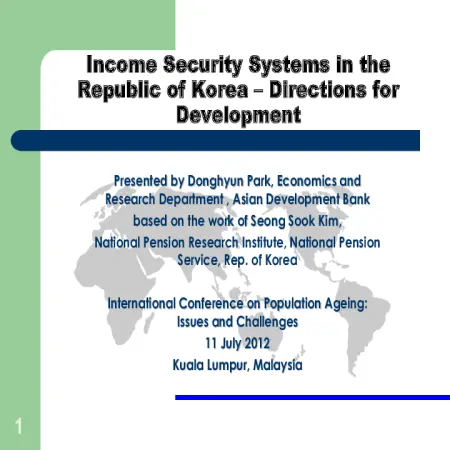|
Income security systems in the Republic of Korea? Directions for development
|
|
: 29614 Views : |
| Item type | Conference or Workshop Item |
| Subjects | 300 Social sciences > 303 Social processes |
| Division/Agency | LPPKN - National Population and Family Development Board, Malaysia: Population and Family Research Division |
| Keywords | Income security scheme, Korea, Pension arrangements |
| Additional Information | Author from Asian Development Bank. |
| Abstract | The four goals of public pensions - extension of coverage, provision of adequate benefits, an equitable share of costs between generations, and financial stability - are all important. However, as these four goals conflict and influence one another, it is difficult to attain them simultaneously. Therefore, it is necessary to compromise these goals at a certain level. National Pension in Korea has been developed within an astonishingly short period. However, coverage is still unsatisfactory and long-term financial state is unstable. These two issues seem to be the most urgent reform priorities. The former may be the most important issue because National Pension exists for the income security of people. Meanwhile, adequacy of benefit was partly relaxed through two reforms. Though long-term financial stability and equity between generations have been improved through some sacrifice of benefit level, these issues are still regarded as unresolved and need additional measures in Korea, one of the most rapidly ageing countries. In this paper, we examine the four major goals of National Pension, namely coverage, adequacy of benefit, inter-generational equity, and long-term financial stability. The coverage of the scheme should be extended and the average contribution period should be increased. Coverage must increase 10% by 2030 in terms of the ratio of old age pensioners to total old age people aged 65 and over. The benefit level of the National Pension may be targeted to 30% of average earnings in real term as of 2030. Other sources of old-age income can be from working, private pensions, and savings. For more stable finance and better equity between generations, we review four financial goals. |











